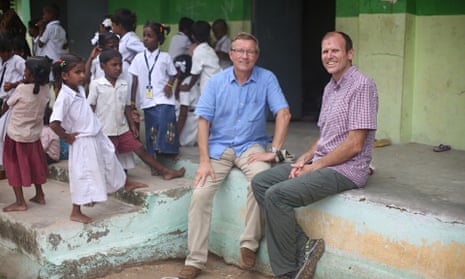“We used to cross the railroad tracks in the dark to defecate. With a toilet at home my children are safe and we can answer the call of nature without fear,” said Mrs Malliga, a WaterCredit borrower who told us her story when we met in India this August. For the first time in her life, Malliga has access to safe water and a toilet in her home. Possibility, safety, hope are the words that come to mind when we listen to how, like so many other women in her community, she had to spend hours scavenging for water and risk her and her children’s safety trying to find a place to defecate after nightfall.
Statistics provided by UNICEF show that India has the largest number of people in the world who still defecate in the open, with a staggering 600m lacking toilets. The lack of access to safe water and sanitation has had a devastating impact on those living at the base of the economic pyramid (BOP). In contrast, it is very rewarding to see the transformation that follows when families gain access to these basic utilities. Our experience with Malliga further fuelled our determination to tackle this global challenge through a partnership that is powering smart innovation in the water sector.
In a world where technology has created opportunities for many, 750 million people still live without access to safe drinking water, while 2.5 billion people lack proper sanitation. This results in water-related disease killing children at a rate equivalent to a classroom every six minutes. Women spend 180m hours per day collecting water for their families, often from polluted sources.
These are harsh truths, however, it is important to emphasise that this is a solvable problem. We know how to install a toilet and we know how to supply a home with permanent access to safe water. In addition, while conventional charity will always be necessary to meet the needs of those living in extreme poverty (those earning less than $1.25 (75p) per day), millions more at the BOP represent a market waiting to be discovered. We know that there is a demand of up to $12bn among the BOP for affordable financial products such as micro-credit loans to install a household toilet or water connection. Understanding this, Water.org pioneered WaterCredit, a market-based model through which the organisation and its local micro-finance institution (MFI) partners help those at the BOP gain access to small loans to pay for water connections and/or toilets in their homes.
Financial inclusion at the BOP for water and sanitation needs represents a significant opportunity to improve the lives and health of families living in poverty. The WaterCredit model has the potential to reach millions of children and their families. Together, our organisations, the IKEA Foundation and Water.org, have dedicated resources to making this happen by refining and expanding the WaterCredit model. While our joint effort initially focuses on Bangladesh, our aim is to scale this model worldwide. Access to the capital people need to invest in a water and/or sanitation solution allows families to buy back their time and live healthier and more productive lives. A water connection means children can go to school and mothers are able to work; a toilet means parents spend time earning instead of caring for sick loved ones. A water connection and a toilet create a cycle of opportunity that can break the cycle of poverty.
As of now, more than 1.5m people have gained access to safe water and sanitation through WaterCredit. Building on this progress, the Ikea Foundation is helping Water.org innovate around the edges of this model by funding market research through Water.org’s new ventures fund. More specifically, the IKEA Foundation will improve the health and wellbeing of nearly 180,000 people in Bangladesh through its partnership with Water.org.
By funding both the WaterCredit and New Ventures Fund, the IKEA Foundation is helping drive forward the critical innovation needed to end the water and sanitation crisis improving the lives of children living in the world’s poorest communities. Combining Water.org’s experience in this sector with IKEA Foundation’s holistic funding model creates tremendous potential to scale the solutions that provide better health and greater opportunities for children and their families.
As the CEOs of two organisations dedicated to empowering people who lack access to safe water and sanitation, we understand that we will not be able to solve this crisis alone. We need the help of others from the public and private sector who can leverage their resources, networks and voice to improve financial inclusion at the BOP for water and sanitation needs. We need more programmes like WaterCredit that drive down the philanthropic cost per person reached with safe water and increase the overall number of people served. If you would like to learn more about Water.org’s WaterCredit initiative, we would love to have you visit the WaterCredit website. We welcome your feedback, ideas and insights. Let’s work together to solve the water crisis and end the cycle of poverty.
Per Heggenes is the CEO of the Ikea Foundation and Gary White is the CEO and co-founder of Water.org
To get weekly news analysis, job alerts and event notifications direct to your inbox, sign up free for Media Network membership.
All Guardian Media Network content is editorially independent except for pieces labelled ‘Advertisement feature’. Find out more here.

Comments (…)
Sign in or create your Guardian account to join the discussion